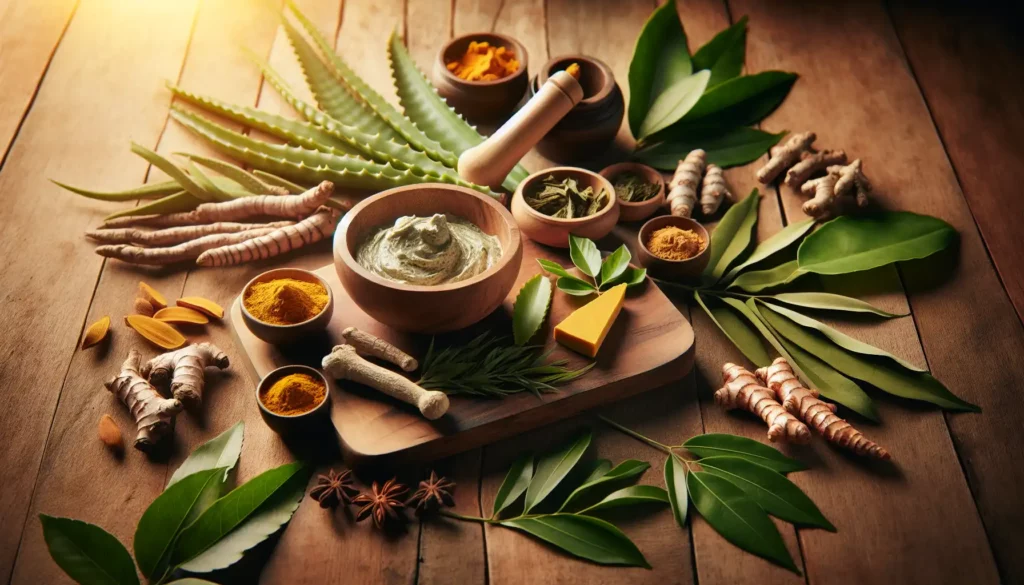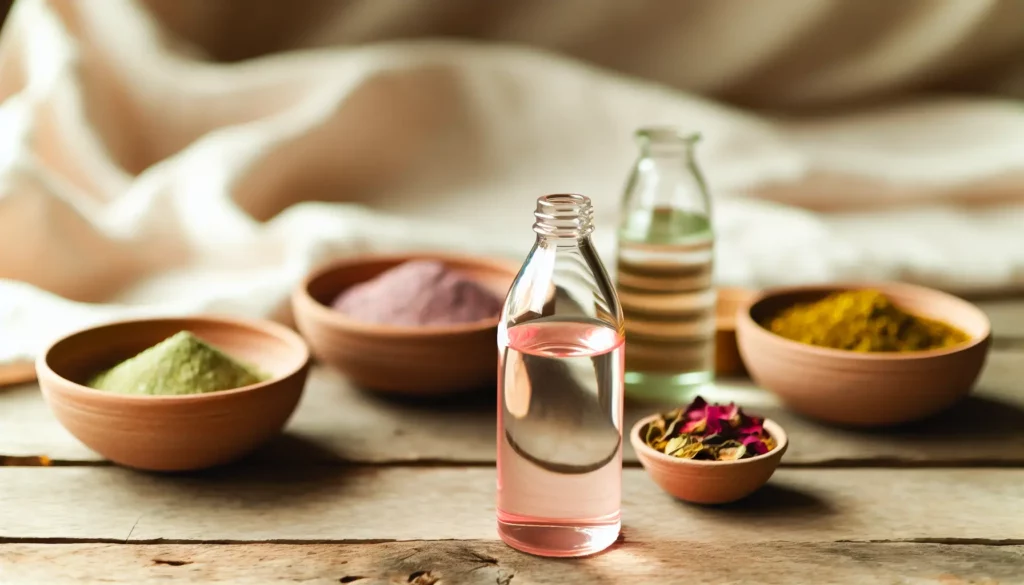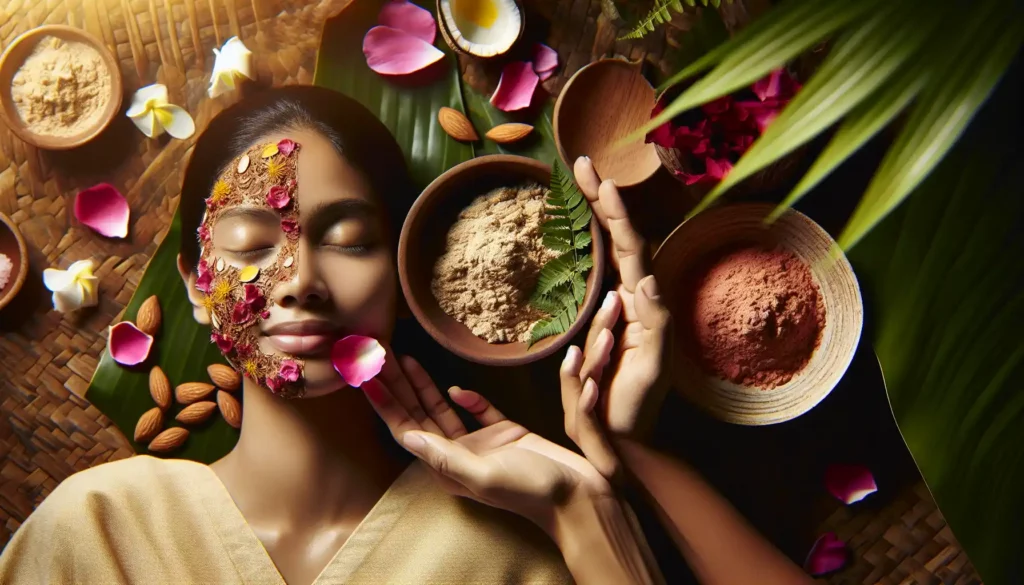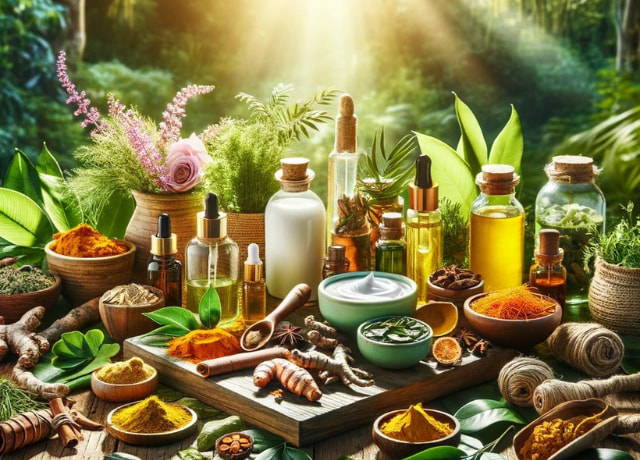Starting an Ayurvedic skincare routine is more than just following steps. It means understanding your skin's unique needs based on Ayurvedic doshas. This guide will explain the roles of Vata, Pitta, and Kapha in finding your perfect skincare ritual. We'll show you the best natural ingredients for your skin type. Plus, you'll get a step-by-step method for achieving balanced, radiant skin.
Essential Insights
- Ayurvedic skincare focuses on balancing the three doshas – Vata, Pitta, and Kapha. These doshas affect your skin's health. This approach supports both inner health and harmony and outer care.
- Personalized Ayurvedic skincare routines use natural ingredients and tailor regiments to your dominant dosha. These routines include cleansing, toning, moisturizing and exfoliating to keep your skin's natural qualities and pH balance.
- A holistic Ayurvedic lifestyle, with a nutrient-rich diet, enough sleep, stress management, and regular exercise, supports your skincare routine. It aims to improve skin health from the inside out.
Understanding Ayurvedic Skincare Principles

Dive into the secret of naturally glowing skin with Ayurvedic skincare principles. Rooted in the ancient science of Ayurveda, these principles approach skin health from a holistic lens, emphasizing internal balance and external nourishment.
The key to this approach lies in understanding the role of doshas—Vata, Pitta, and Kapha—in skin health. These doshas, influenced by many factors like lifestyle and diet, dictate the condition and characteristics of our skin.
You might be wondering how these doshas influence your skin type and skincare needs. Let’s explore the realm of doshas and find a custom-made skincare regimen for you.
The Role of Doshas in Skincare
Serving as the guiding principles of Ayurveda, doshas—Vata, Pitta, and Kapha—have a profound impact on our skin’s health.
Each individual has a unique balance of doshas that determine not only their physical constitution and personality but also their skin characteristics. For instance, Vata skin tends to be dry and age quickly, while Pitta skin is sensitive and prone to acne. On the other hand, Kapha skin is usually normal or oily, with a slower aging process.
However, an increase in a non-dominant dosha can disrupt this balance, leading to specific skin problems. Here’s where the beauty of Ayurvedic skincare comes into play. It aims to support the skin’s natural balance and overall health by respecting the unique influence of each dosha.
Identifying Your Ayurvedic Skin Type
Identifying your dominant dosha is the initial step in formulating your personalized Ayurvedic skincare regimen. Here are some recommendations based on your dosha:
♥ Vata skin should be treated with nourishing and hydrating products.
♥ Pitta skin requires sun protection and gentle care.
♥ Kapha skin benefits from warm oil massages and gentle exfoliation.
Your Ayurvedic skin type isn’t just about the products you apply topically; it’s also intricately connected to internal factors. The equilibrium of doshas, optimal metabolism, circulation, and moisture levels all play a vital role in skin health.
In essence, identifying your Ayurvedic skin type allows you to adopt a skincare routine that nurtures your skin both internally and externally.
Crafting Your Personalized Ayurvedic Skincare Routine

Armed with knowledge about Ayurvedic skincare principles and the significance of doshas, you’re now ready to formulate your skincare routine. Ayurvedic skincare incorporates natural ingredients such as:
- Aloe leaf
- Peppermint
- Rose
- Chamomile
This creates a holistic approach that addresses the needs of your specific skin type.
A typical daily Ayurvedic skincare routine includes:
Each step is customized with herbal products that suit the individual’s skin type.
Let’s now explore these steps and understand how to cleanse, exfoliate, and moisturize your skin following Ayurvedic principles.
Cleansing: The Foundation of Healthy Skin
In the realm of Ayurveda, cleansing is viewed as the cornerstone of a skincare routine. It prepares the skin to absorb the full benefits of treatment products. Regular cleansing removes accumulated dirt, pollutants, and dead cells, promoting a rejuvenated appearance of the skin.
Ayurvedic cleansers focus on natural ingredients such as honey, clay, and herbs. They clean gently, without removing the skin's natural oils or altering its pH balance. Ubtans, traditional Ayurvedic cleansers, are made for various skin types to maintain the skin's natural pH.
Exfoliation: Revealing Radiant Skin

Exfoliation holds as much importance in Ayurvedic skincare as does cleansing. It stimulates the lymphatic system, removes dead skin cells, prevents dullness, and improves mood. But unlike conventional methods of exfoliation that can be harsh on the skin, Ayurveda advocates for natural exfoliants such as:
- Ground almonds
- Rice flour
- Oatmeal
- Chickpea flour
These natural exfoliants are gentle and nourish the skin while removing dead cells, resulting in a soft and smooth texture.
Natural Ayurvedic exfoliants, such as rice powder or chickpea flour, are skin-friendly. They keep the skin's pH balanced and improve product absorption. Remember, exfoliating is good but should be limited. Ayurvedic guidelines suggest not exfoliating more than twice a week to prevent over-exfoliation and keep the skin's natural balance.
Moisturizing and Nourishing: Maintaining Balance
After cleansing and exfoliating, the next step in your Ayurvedic skincare routine is to moisturize and nourish your skin. Use oils rich in fatty acids and antioxidants, key to Ayurvedic skincare. They help in the skin’s natural renewal process and keep it hydrated, especially when used with self-massage techniques.
It's essential to know your dosha and skin type because certain oils, like sesame for Vata and coconut for Pitta, help balance your skin's natural traits.
Ayurvedic skincare also includes ingredients like aloe vera and ghee, celebrated for their moisturizing effects, to hydrate and calm the skin.
Enhance Your Skincare Routine with Ayurvedic Lifestyle Practices

While topical treatments are key in Ayurvedic skincare, achieving radiant skin extends beyond your daily routine. Ayurveda promotes a holistic approach, including diet adjustments, enough sleep, and regular exercise, to enhance overall skin health.
From nourishing your skin with the correct nutrients to regulating your sleep and stress levels, each facet of your lifestyle contributes to your skin’s health. Explore how you can enhance your skincare routine with these Ayurvedic lifestyle practices.
Diet and Nutrition: Feeding Your Skin
A proper diet and good nutrition are crucial for keeping your skin healthy and vibrant. Drinking plenty of pure, chemical-free water, including lukewarm water during the day, is vital for keeping your skin hydrated and detoxifying your body.
Eating fresh fruits and vegetables such as grapes, blueberries, pomegranates, lettuce, and carrots, and getting healthy fats from extra-virgin olive oil and organic ghee, boosts heart health and enhances the skin's natural radiance. Also, adding Ayurvedic supplements like Organic Premium Amla Berry, which is high in Vitamin C, can refresh your body's systems and result in soft, glowing skin.
Sleep and Stress Management: Restoring Inner Balance
A restful night’s sleep benefits not only your overall health but also holds significant importance for your skin. Inadequate sleep can lead to skin concerns such as inflammation and accelerated aging. Ayurveda offers numerous techniques to enhance sleep quality, such as self-massage with warm oil, which can enhance skin complexion and act as a natural moisturizer.
In addition to sleep, managing stress is equally important for healthy skin. Practices such as meditation and yoga not only help manage stress but also balance vata, indirectly benefiting skin hydration and counteracting stress-related skin aging.
Exercise and Detoxification: Boosting Circulation
Physical activity is a key component in Ayurvedic skincare. Regular physical activities like brisk walking or light jogging significantly improve blood circulation to the skin, enhancing skin tone and natural radiance.
Besides regular exercise, Ayurveda recommends specific activities such as Surya Namaskar and twisting yoga asanas. These practices boost skin detoxification by improving digestion and encouraging sweating, which helps remove waste.
Additionally, using a GuaSha Stone can further enhance circulation and support lymphatic drainage, promoting a healthy, glowing complexion.
Ayurvedic Skincare Remedies for Common Skin Concerns

Even with careful maintenance, skin problems like acne, dryness, and aging can occur. However, there's no need to worry; Ayurveda provides herbal remedies using natural ingredients and herbs for these specific concerns. It delivers holistic care, from anti-aging treatments to acne and blemish solutions, tackling both localized and systemic issues.
Acne and Blemishes
Acne and blemishes can lead to discomfort and a dip in self-esteem. Luckily, Ayurveda offers herbal remedies for these skin issues. Some traditional Ayurvedic applications known to help address acne include:
- Combinations of turmeric and mint juice
- Sesame seed paste
- Neem leaf salve
- Aloe vera gel
- Honey and lemon juice mixture
These natural mixtures should be applied to the face, left to dry for a specific amount of time, and then washed off, offering a non-invasive and nourishing approach to managing acne.
This practice will help you achieve that clear and radiant complexion you’ve always desired.
Dryness and Dehydration
Dryness and dehydration can render your skin dull and devoid of life, even causing a greasy skin texture. Ayurveda suggests several remedies for these skin issues. Abhyanga, or self-massage, with vata-balancing oils like sesame or almond, can promote hydration.
Herbal remedies including Ashwagandha, shatavari, and vidari, known for their sweet and warm properties, help to de-stress and hydrate the body, beneficial for dry skin. Additionally, applying a paste made from:
- Neem leaves
- Aloe vera gel
- Barley
- Turmeric powder
provides moisture, helps to retain it, and exfoliates the skin while also delivering antioxidants.
Aging and Wrinkles
While aging is natural, Ayurveda can effectively manage premature aging and wrinkles. Ayurvedic anti-aging treatments aim to rejuvenate and preserve skin youthfulness. They work by maintaining the balance of the three gunas: Vata, Pitta, and Kapha.
Herbs classified as Sandhaniya, are known for their healing functions, aid in skin regeneration, and help reverse the effects of aging. Sensitive plants in Ayurvedic medicine can improve the skin’s repairing properties significantly. Additionally, herbs like vetiver and sandalwood contribute to skin brightening.




Ayurvedic practices are such an amazing way to lead a healthy lifestyle and skincare routine. 🌿 Definitely worth exploring for anyone interested in natural and balanced skincare solutions!
You’re 100% right! Thank you!